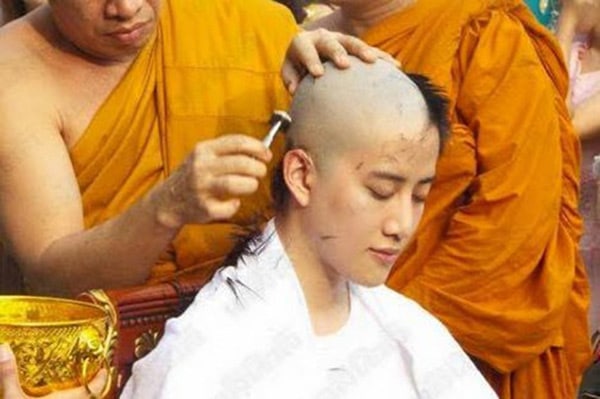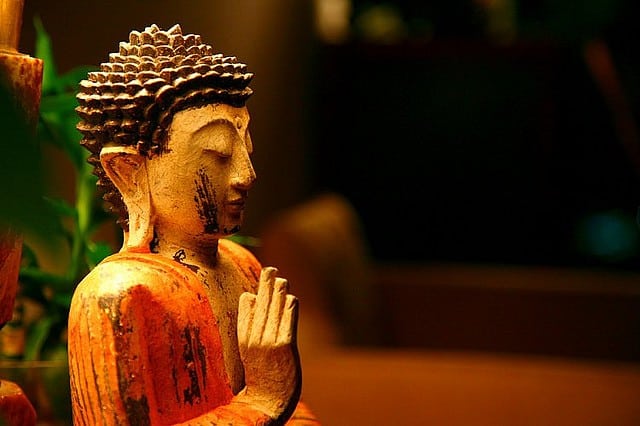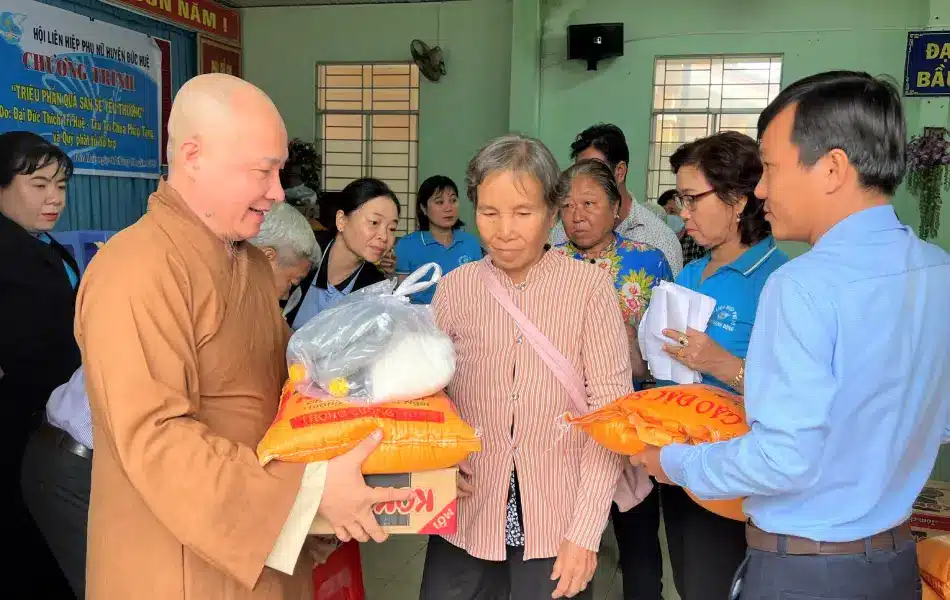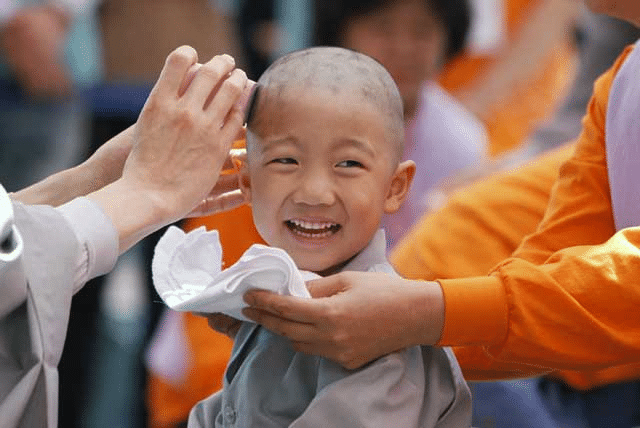A monk is someone who has renounced worldly life and no longer lives as ordinary people do. Instead, this person lives and practices according to the teachings of the Buddha. If someone wishes to become a monk, how can they go about doing so?
Hello there, how are you feeling today? I am a Buddhist monk with Dharma name Thich Tue Minh. Allow me to introduce you to the fascinating world of a Buddhist monk, a journey that starts with a gentle step towards inner peace and blossoms into a deep understanding of the interrelatedness of all life.
As you embark on this path, you will discover the profound wisdom in the teachings of the Buddha, illuminating the path to liberation from suffering and achieving lasting happiness. But you must truly practice these teachings to experience the benefits they bring. I see many people treat Buddhist teachings as mere intellectual knowledge. They read, understand, analyze and interpret them, making them seem complex and esoteric… but perhaps they do not truly practice them.
As a Buddhist monk, we renounce the trappings of worldly life, following a simple, humble and devoted path. Our days are filled with meditation, mindfulness and contemplation, as we strive to deepen our understanding of the nature of reality and the seed of compassion within our own hearts.
What is a Buddhist Monk?

A Buddhist monk is a person who renounces the worldly life, also known as a renunciant, immersing themselves in a life of ethics and practicing according to the teachings of the Buddha in order to seek wisdom, inner peace and ultimately enlightenment.
We, as monks or bhikkhus as you may know in Pali, leave behind the hustle and bustle of worldly life to live a simple and meditative life. Following the example of the Buddha, who renounced a life of luxury and wealth to seek truth. Through his philosophical teachings, we come to realize that true happiness does not come from material possessions, but from awareness in the mind, from our love and compassion towards all living beings on this planet.
Within the folds of our robes, we find comfort from the material world and focus on cultivating our minds to gain deep insights into the true nature of reality. From there, we aim to develop qualities of compassion and equanimity, to benefit all sentient beings.
How Do You Become a Buddhist Monk?

To become a Buddhist monk, you must have a sincere and genuine desire to renounce worldly life and dedicate yourself fully to the spiritual path, as the Buddha has laid out.
It is difficult for someone to leave behind worldly life and enter monastic life, where strict “rules” are set to “shape” individuals to be more disciplined and moral. Social prejudices will pull you back to the ordinary path that most people on earth choose to follow.
Do you have the strength to give up everyday pleasures and habits to become a Buddhist monk? From my experience, those who choose to become monks often experience a life-changing event that helps them realize what true happiness is. Very few normal people who are “happy” in worldly life choose the path of a Buddhist monk.
Dear friend, this journey is not easy, but with dedication and a heart full of compassion, it is the path that leads to great wisdom and inner peace. The following is the process for someone to become a Buddhist monk:
Take refuge: The next step is to formally “take refuge” in the Triple Gem — the Buddha, Dharma (his teachings), and Sangha (the monastic community). This is a way of expressing your commitment to the Buddhist path and seeking guidance from the three jewels.
Study and practice: Immerse yourself in the teachings of the Buddha by studying the sacred texts, engaging in meditation, and participating in the daily life of the sangha. This period of study and practice allows you to deepen your understanding and commitment to the path.
Find a teacher: Seek out a respected and experienced monk or nun, who will guide you on your journey, offering instruction, support, and guidance. It is important to find a teacher with whom you feel a deep connection, as this relationship will help to shape your monastic life.
Ordination: Once you and your teacher feel you are ready, you may request to be ordained as a novice monk or nun, known as a samanera or samaneri. This involves a formal ceremony in which you receive your monastic robes and shave your head, symbolizing your renunciation of the worldly life.
Uphold the precepts: As a novice, you will abide by the Ten Precepts, a set of ethical guidelines that help to cultivate mindfulness, simplicity, and compassion. These precepts form the foundation of the monastic life and will help you to develop the qualities necessary for your journey.
Become a fully ordained monk: After a period of training as a novice, typically ranging from a few months to a few years, you may request to become a fully ordained monk or nun, known as a bhikkhu or bhikkhuni. This involves a more formal ceremony and a commitment to uphold the monastic code of conduct, called the Vinaya.
And so, my dear friend, these are the steps that lead one to the life of a Buddhist monk. It is a journey of self-discovery, discipline, and devotion, and one that brings great blessings to both the practitioner and the world. May your path be filled with wisdom, compassion, and inner peace. Don’t worry! If your determination is strong enough, the whole universe will conspire to help make your dreams come true.
What Do Buddhist Monks Do?

Tue Minh is honored to share with you the daily life and duties of a Buddhist monk, as it is a life of dedication to cultivating inner peace and wisdom. Our days are shaped by simplicity, mindfulness, and contemplation.
Meditation: We engage in meditation daily, both in the early morning and evening. This practice helps us to still our minds, cultivate mindfulness, and develop insight into the true nature of reality. There are many forms of meditation, such as breath awareness, loving-kindness, and insight meditation, each with its unique focus and benefits.
Chanting: We recite sacred chants and texts, often in the native language translated from ancient Pali texts, as a way to deepen our understanding of the Buddha’s teachings and cultivate spiritual discipline. Reciting scriptures is also a reverent action and a means to generate positive energy within ourselves and the surrounding environment.
Alms Round: As a Theravada Buddhist monk, in the early morning, we go on an alms round, walking through the local community to receive offerings of food from laypeople. This practice helps nurture humility and gratitude, reminding us of our interdependence with the supportive community on our spiritual journey.
Study: We spend time studying the Buddha’s teachings, or Dharma, found in the sacred texts known as the Pali Canon. This study helps to deepen our understanding of the path and guides us in our practice.
Work: We participate in mindful work, or “dana,” around the monastery, such as sweeping, gardening, and maintaining the premises. This work is a form of meditation in action, helping us to cultivate mindfulness and diligence in all aspects of our lives.
Teach and guide: Some senior monks, particularly those with more experience, may teach or guide laypeople, novices, or nuns. This is an important part of our practice, as it allows us to share the wisdom we have cultivated on our own journey with more people.
Retreats: Monks often participate in meditation retreats, periods of intense practice that can last anywhere from a few days to several months. These retreats provide an opportunity for deeper reflection and insight, allowing us to progress further along the path.
In essence, dear friend, a Buddhist monk’s life is centered around the cultivation of mindfulness, wisdom, and compassion, in accordance with the teachings of the Buddha. Our daily activities are designed to help us develop these qualities, and as we do so, we aspire to bring peace and happiness to ourselves and all sentient beings.
What are The Rules for Buddhist Monks?

Are you starting to feel “tired” becoming a Buddhist monk? As I shared at the beginning of the article, the life of a monk is not easy. You need strong faith and determination to walk this path. Otherwise, you will return to the mundane path, where happiness comes and goes, and suffering prevails.
I also note that temples or monasteries are not places for you to escape from suffering or to seek peace to satisfy your selfish desires. Monasteries are places to cultivate positive qualities and to dedicate these qualities to all beings.
Regarding the Buddhist precepts, as a monk, we must follow the rules known as Vinaya, a code of ethical conduct established by the Buddha to help us maintain discipline, purity, and mindfulness in our daily lives. There are many rules in the Vinaya, but I will share with you some of the most basic rules, which are categorized as Patimokkha.
The Four Parajikas: These are the most severe rules, and breaking any of these results in immediate expulsion from the monastic order. They include refraining from engaging in sexual intercourse, stealing, taking a human life, and falsely claiming spiritual attainments.
The Thirteen Sanghadisesas: These are serious offenses that require formal confession and a period of penance. They involve matters such as causing a schism within the monastic community, harming fellow monks, or engaging in inappropriate physical contact with the opposite sex.
The Thirty Nissaggiya Pacittiya: These rules involve the proper use and care of monastic requisites, such as robes, alms bowls, and dwelling places. If a monk breaks any of these rules, he must confess and relinquish the improperly acquired item.
The Ninety-two Pacittiya: These are less severe rules, which require confession and making amends. They cover a wide range of matters, such as eating at inappropriate times, handling money, or engaging in idle chatter.
The Seven Adhikarana-samatha: These are rules that guide the resolution of disputes within the monastic community, promoting harmony and understanding among the members.
In addition to these rules, novice monks, or samaneras, follow the Ten Precepts, which are a more basic set of ethical guidelines. They include refraining from killing, stealing, sexual misconduct, lying, intoxicants, eating after noon, attending entertainment, adorning oneself with jewelry or cosmetics, sleeping on high or luxurious beds, and accepting money.
Dear one, these rules form the foundation of our monastic life and serve to maintain the integrity of the Buddhist monastic order. By adhering to the Vinaya, we cultivate mindfulness, simplicity, and moral purity, allowing us to progress on the path to inner peace and enlightenment.
What is The Role of Buddhist Monks in Society?

As you know, an individual’s life consists of both material and spiritual aspects. We, Buddhist monks, have the task of providing highly nutritious spiritual food for this society.
Spiritual guidance: Monks serve as spiritual guides and teachers, helping laypeople to better understand and practice the Buddha’s teachings. By sharing our knowledge of the Dharma, we help individuals navigate the challenges of life with greater wisdom and compassion.
Meditation instruction: We teach various forms of meditation to laypeople, helping them cultivate mindfulness, tranquility, and insight. Through meditation, individuals can develop inner peace and emotional resilience, which contribute to a harmonious society.
Preserving the Dharma: We dedicate ourselves to the study, practice, and preservation of the Buddha’s teachings, ensuring that these profound insights are passed down through generations, so that the light of the Dharma continues to illuminate the world.
Rituals and ceremonies: We perform various rituals and ceremonies, such as blessings, funerals, and weddings, which offer spiritual support and comfort to the lay community during important life transitions and events.
Compassionate service: Monks engage in acts of compassionate service, such as providing food, shelter, or education to those in need. In some Buddhist traditions, monks may also be involved in social work, healthcare, or environmental conservation efforts, as a way to alleviate suffering in the world.
Moral exemplars: By living according to the monastic code of discipline, the Vinaya, and cultivating mindfulness, loving-kindness, and wisdom, we serve as moral exemplars for society, inspiring others to live ethically and harmoniously.
Interfaith dialogue: Monks often participate in interfaith dialogue, promoting understanding, tolerance, and cooperation among different religious traditions, fostering a spirit of unity and mutual respect.
Practicing as a Buddhist monk does not mean that we abandon the secular world, reject society, or run away from it in search of peace. This idea is often misunderstood. Under the light of Non-self wisdom, we are not individual entities, but rather interdependent beings, supporting each other’s growth and development.
Dear friend, the role of a Buddhist monk in society is to embody the teachings of the Buddha, guide and support others on their spiritual journey, and work towards reducing suffering for all beings. By nurturing inner peace, wisdom, and insight, we strive to bring light and harmony to the world.
Why do Buddhist Monks Shave Their Heads?

To be honest, sometimes I laugh when I receive this question from laypeople. Shaving the head is an important aspect of the monastic life for Buddhist monks and nuns. Shaving the head is both a symbolic gesture and a practical necessity, and I am happy to share its meaning with you.
From a symbolic perspective, shaving our heads represents our renunciation of the worldly life and its attachments. Hair is often associated with beauty, vanity, and personal identity. By shaving our heads, we let go of these attachments and embrace a life of simplicity and humility, free from the distractions of physical appearance. It serves as a reminder that our focus should be on the inner journey of spiritual growth, rather than on the outer trappings of the world.
From a practical standpoint, maintaining a shaved head is an act of simplicity and cleanliness. In the monastic life, we strive to live with as few possessions and complications as possible, so that we may devote ourselves wholeheartedly to our spiritual practice. Shaving our heads simplifies our grooming routine and minimizes the need for personal care items, such as combs, shampoos, and so on.
Moreover, dear one, the act of shaving our heads helps to foster a sense of unity and equality within the monastic community. With our heads shaved, we are all visually similar, transcending differences in social status, wealth, and cultural background. This visual reminder of our shared commitment to the Buddhist path serves to strengthen the bonds of our spiritual brotherhood and sisterhood.
Can Women be Buddhist Monks?

Women can become Buddhist monks, and their presence in our monastic community has a long and rich history. In the time of the Buddha, women were granted the opportunity to renounce worldly life and follow the spiritual path as ordained monastics. The Buddha established the order of bhikkhunis, or fully ordained nuns, after his stepmother, Mahapajapati Gotami, requested to join the monastic community. From that moment on, women have played a significant role in the development and propagation of Buddhism.
In the Theravada tradition, the bhikkhuni order faced challenges over the centuries, and at times, it was believed to have disappeared entirely. However, in recent decades, there has been a resurgence of interest and efforts to revive the bhikkhuni order. Today, you can find fully ordained nuns in many Theravada countries, such as Sri Lanka, Thailand, and Myanmar, as well as in Western countries.
In the Mahayana tradition, the bhikkhuni order has been preserved and continues to flourish, particularly in countries such as Taiwan, Vietnam, and Korea. Here, you can find many prominent female monastic practitioners who contribute significantly to the growth and development of Buddhism.
So, my dear friend, women can indeed become Buddhist monks, or nuns, and they have an essential role to play in preserving and propagating the Buddha’s teachings. Their dedication, wisdom, and compassion enrich the monastic community, and their spiritual journey serves as an inspiration for countless others. May your path be illuminated by the light of wisdom, and may your heart be filled with boundless loving-kindness. Buddhism always opens its arms to welcome those with a good heart and sincere purpose.
The information about the life of a Buddhist monk that Thich Tue Minh shared is very interesting, isn’t it, everyone! LotusBuddhas hopes that through this knowledge, you can better understand what a Buddhist monk is like and how to become a Buddhist monk if you truly desire to do so.





